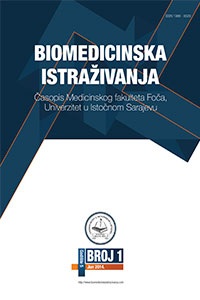Personality dimensions and social variables – predictors of cigarette smoking and alcohol consumption in adolescence
DOI:
https://doi.org/10.7251/BII1702153IAbstract
Introduction. The aim of the study was to examine the contribution of personal
traits and social variables to the prediction of the frequency of cigarette and
alcohol use in adolescents.
Methods. Two questionnaires: Big Five Inventory (BFI) and Role of Parents
and Friends questionnaire were used in the pertinent sample of fourth-grade
elementary school students (N = 268), 18 ± 1.76 years of age. The calculated
Cronbach’s alpha coefficient indicated a satisfactory internal consistency of
the applied measuring instruments.
Results. Approximately 70% of adolescents did not smoke cigarettes, and 64%
of them did not consume alcohol. Correlation analysis showed statistically
significant connection between several variables. The results of hierarchical
regression analysis, with the p < 0.01, showed that predictors explained 26%
of total criterion variance (the frequency of cigarette smoking), and 27% of
total criterion variance (the frequency of alcohol consumption), respectively.
Thereat the following variables had statistically significant independent
contribution to cigarette smoking: gender, neurosis, openness to experiences,
cigarette smoking – parents and friends’ reaction to cigarettes, while the best
predictors of alcohol consumption among adolescents were agreeableness,
alcohol consumption – friends, and friends’ reaction to alcohol consumption.
Conclusion. The obtained data provided an important insight into the significance
of insufficiently explored relations between social factors and personality
traits and cigarette and alcohol use among adolescents.

